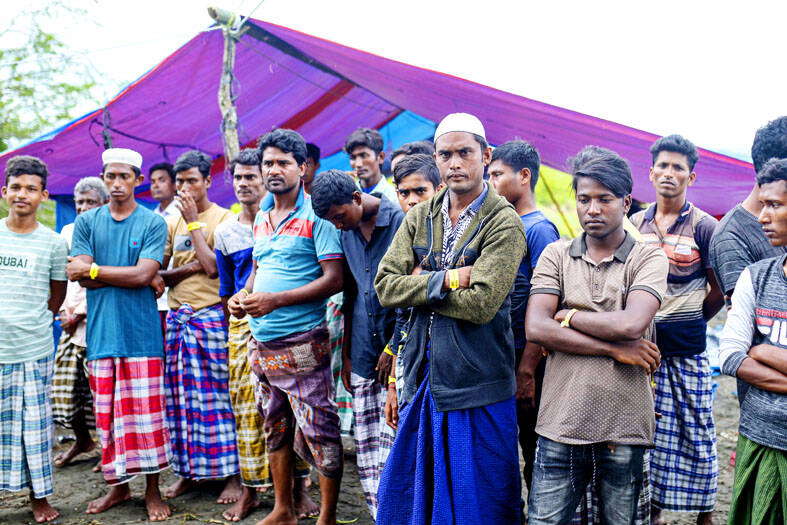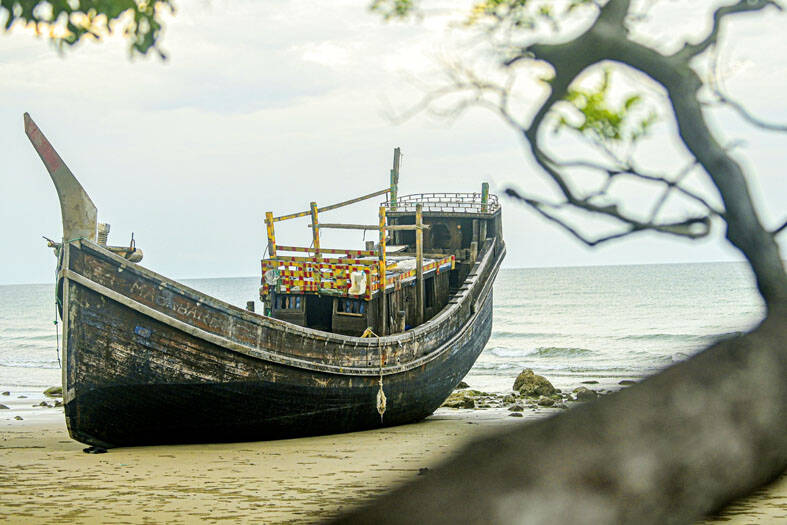The screams were heard soon after the ailing boat emerged into view. On board were babies and children, alongside mothers and fathers begging to be saved.
The passengers were Rohingya Muslims who had fled surging gang violence and rampant hunger in the refugee camps of Bangladesh, only to find themselves adrift with a broken engine on the Andaman Sea. For a moment, it appeared their salvation had arrived in the form of another boat carrying Rohingya refugees that had pulled up alongside them.
Yet those on board the other boat — itself overloaded and beginning to leak — knew that if they allowed the distressed passengers onto their vessel, it would sink and all would die.

Photo: AP
They wanted to help, but they also wanted to live.
Since last month, more than 1,500 Rohingya refugees fleeing Bangladesh by boat have landed in Indonesia’s northern Aceh Province — three-quarters of them women and children.
On Thursday, Indonesian authorities spotted another five boats approaching Aceh’s coast.

Photo: AP
With so many Rohingya attempting the crossing in the past few weeks, nobody knows how many boats did not make it, and how many people died.
This account of two boats was told to The Associated Press by five survivors from the vessel that made it ashore. It provides the first clues into the fate of the boat carrying up to 200 Rohingya refugees that vanished weeks ago.
On Dec. 2, the UN High Commissioner for Refugees put out an urgent message about the two distressed boats and urged countries to look for them.

Photo: AP
However, in the case of the boat that remains missing, it appears no one searched.
From a beach near where they staggered ashore on Dec. 10, the survivors spoke of their harrowing journey.
“I remember feeling that together, we would be finished. Together, we would sink. Together, we would drown,” says 31-year-old Muhammed Jubair, who was among the 180 people on his boat to be rescued, along with his three children, wife and brother-in-law.
The story of the missing boat and its passengers begins the way most Rohingya boat journeys do — with tearful goodbyes in in the camps of Bangladesh, where more than 750,000 Rohingya fled in 2017 following attacks by the military in their homeland, Myanmar.
In one of those shelters, Noor Fatima held her 14-year-old brother, Muhammed Ansar, as he began to cry. The family hoped Ansar would get a job in Indonesia that could help support them. There were few alternatives: Bangladesh bans camp residents from working, so their survival depends on food rations, which were slashed this year.
It was Nov. 20, and Ansar would be making the trip with several relatives, including his 20-year-old cousin, Samira Khatun, and her three-year-old son.
The next day, Samira called Fatima’s family, telling them they were aboard the boat.
“We are on our way,” she said. “Pray for us.”
Meanwhile, the boat Jubair and his family were on was chugging across the sea. Days into its journey, the passengers on Jubair’s boat spotted Ansar and Samira’s boat; its engine was broken and water was seeping in.
Those on Jubair’s boat worried if they got too close, the people on the ailing vessel would jump onto their boat, sinking them all, said one of Jubair’s fellow passengers, Rujinah, who goes by one name.
As Jubair’s boat drew nearer, 20 to 30 people began preparing to make the jump, said Zakir Hussain, another passenger.
The captain of Jubair’s boat shouted at those on the distressed vessel to stay put. Then he asked for a rope so he could tie the boats together, and tow their boat.
Two or three nights later, a storm erupted. Pounding waves destroyed the engine on Jubair’s vessel.
It was then, that the ropes between the two vessels were severed, the passengers on Jubair’s boat said.
Jubair could hear the passengers on the other boat pleading for their lives.
“They were crying and shouting loudly: ‘Our ropes are broken. Our ropes are broken. Please help us.’ But how could we help?” Jubair said. “We would die with them.”
The other boat vanished from view.
For days, Jubair and his fellow passengers languished at sea, their food and water gone. Eventually, a plane spotted them, and a navy ship arrived, delivering supplies. The vessel towed them into Indonesian waters and then left when their boat was close to land.
That is when their captain and another crew member fled the vessel on a fishing boat, Jubair said.
The abandoned passengers guided their battered boat to shore. Although they have no idea what their future holds, at least they are alive.
Meanwhile, a familiar feeling of dread has crept into Bangladesh’s camps, which last year mourned the loss of another boat carrying 180 people.
Fatima said she struggles to sleep as she waits for news of Ansar, her brother.
One way or another, they just want answers, she said.

Kehinde Sanni spends his days smoothing out dents and repainting scratched bumpers in a modest autobody shop in Lagos. He has never left Nigeria, yet he speaks glowingly of Burkina Faso military leader Ibrahim Traore. “Nigeria needs someone like Ibrahim Traore of Burkina Faso. He is doing well for his country,” Sanni said. His admiration is shaped by a steady stream of viral videos, memes and social media posts — many misleading or outright false — portraying Traore as a fearless reformer who defied Western powers and reclaimed his country’s dignity. The Burkinabe strongman swept into power following a coup in September 2022

‘FRAGMENTING’: British politics have for a long time been dominated by the Labor Party and the Tories, but polls suggest that Reform now poses a significant challenge Hard-right upstarts Reform UK snatched a parliamentary seat from British Prime Minister Keir Starmer’s Labor Party yesterday in local elections that dealt a blow to the UK’s two establishment parties. Reform, led by anti-immigrant firebrand Nigel Farage, won the by-election in Runcorn and Helsby in northwest England by just six votes, as it picked up gains in other localities, including one mayoralty. The group’s strong showing continues momentum it built up at last year’s general election and appears to confirm a trend that the UK is entering an era of multi-party politics. “For the movement, for the party it’s a very, very big

ENTERTAINMENT: Rio officials have a history of organizing massive concerts on Copacabana Beach, with Madonna’s show drawing about 1.6 million fans last year Lady Gaga on Saturday night gave a free concert in front of 2 million fans who poured onto Copacabana Beach in Rio de Janeiro for the biggest show of her career. “Tonight, we’re making history... Thank you for making history with me,” Lady Gaga told a screaming crowd. The Mother Monster, as she is known, started the show at about 10:10pm local time with her 2011 song Bloody Mary. Cries of joy rose from the tightly packed fans who sang and danced shoulder-to-shoulder on the vast stretch of sand. Concert organizers said 2.1 million people attended the show. Lady Gaga

SUPPORT: The Australian prime minister promised to back Kyiv against Russia’s invasion, saying: ‘That’s my government’s position. It was yesterday. It still is’ Left-leaning Australian Prime Minister Anthony Albanese yesterday basked in his landslide election win, promising a “disciplined, orderly” government to confront cost-of-living pain and tariff turmoil. People clapped as the 62-year-old and his fiancee, Jodie Haydon, who visited his old inner Sydney haunt, Cafe Italia, surrounded by a crowd of jostling photographers and journalists. Albanese’s Labor Party is on course to win at least 83 seats in the 150-member parliament, partial results showed. Opposition leader Peter Dutton’s conservative Liberal-National coalition had just 38 seats, and other parties 12. Another 17 seats were still in doubt. “We will be a disciplined, orderly